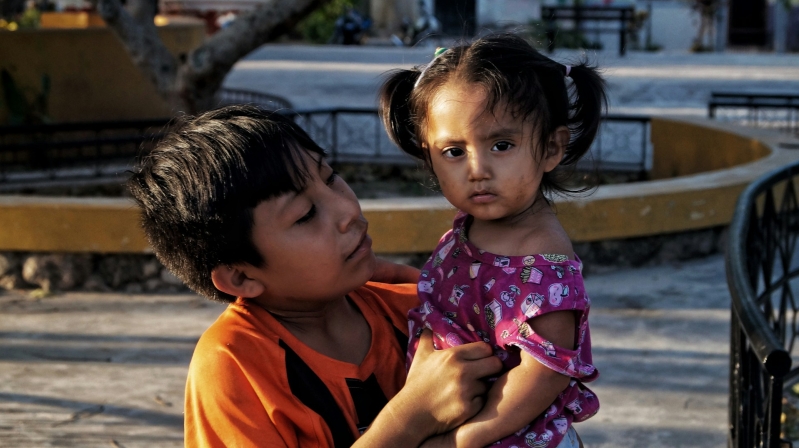
Nearly 3 million children in the United States have lost a parent or grandparent caregiver over the past two decades, revealing what experts are calling a hidden public health crisis. The scale of orphanhood, driven largely by drug overdoses and other “deaths of despair,” mirrors similar trends in countries such as Colombia, Brazil and across parts of sub-Saharan Africa. At a recent international webinar, child welfare experts examined new data and discussed practical, community-based solutions to support children left behind.
The virtual event, “Crisis-Driven Orphanhood: Estimates and Policy Response to Protect Children,” was co-sponsored by the Georgetown University Collaborative on Global Children’s Issues in Washington, D.C., the Thrive Center for Children, Families, and Communities, and the Global Reference Group on Children Affected by Crisis.
Discussion centered on a January 2025 report published in Nature Medicine, titled “Orphanhood and caregiver death among children in the United States by all-cause mortality, 2000–2021.” The study revealed a sharp rise in the number of U.S. children ages 0 to 17 who lost parents or grandparent caregivers, with a 49.6% increase in incidence and a 7.9% increase in prevalence over the 21-year period. Drug overdoses emerged as the top cause of caregiver deaths, often linked to broader social and economic challenges.
US faces surge in orphanhood from “Deaths of Despair”
Gillian Huebner, a global child rights and protection specialist with the Georgetown University Collaborative on Global Children’s Issues, described the findings as evidence of a “significant increase in orphanhood in the last two decades in the U.S.” She illustrated the personal impact by noting that, effectively, “one child in every school classroom throughout the country has experienced the death of a parent or caregiver.”
The leading cause of orphanhood in the United States is attributed to “deaths of despair”—a term encompassing drug overdoses, suicide, homicide and unintentional injuries.
“This is a public health crisis,” Huebner said. “And we can learn from other parts of the world about how to effectively respond.”
Statistician Oliver Ratmann of Imperial College London said the figure of 2.91 million orphans in the U.S. is “an order of magnitude larger than any previous cause-specific estimates.”
He reported that the demographics most affected include non-Hispanic American Indian and Native Alaskan children, non-Hispanic Black children, and those living in southern and eastern states.
“In 30 US states, drug overdose was the leading cause of all,” Ratmann said. “And we found that the highest prevalence rates were in West Virginia, New Mexico, Mississippi, Louisiana, and Kentucky. And these are also the states that had a highest poverty ranking.”
He explained that drug use rose during the COVID-19 pandemic, contributing to increased suicide rates and a broader surge in deaths among parents and grandparent caregivers. This led to more children becoming orphans. Ratmann noted that father deaths saw a marked rise and that adolescents were more likely to be orphaned than younger children.
UNICEF stresses family-based models over institutions
Kirsten Di Martino, senior advisor on child protection for UNICEF, agreed and emphasized that children suffer not only “significant trauma” after losing parents or caregivers, but also face “an increased risk of violence, abuse and exploitation in many different forms.”
She explained that higher rates of institutionalization among orphans—those separated from their birth families—often indicate a weak child protection system in countries unable to support and preserve families. Di Martino said this underscores the value of family-based care models.
Children placed in residential care are more likely to experience neglect, a lack of individualized attention, and limited emotional bonds. On top of that, they may face heightened risks of violence, which can harm their development both immediately and over time.
According to Di Martino, an estimated 2.5 million children were living in formalized care in 87 countries with UNICEF programs as of 2024.
She noted that many countries lack trained social workers who can provide vulnerable families with essential services, including parenting guidance, mental health resources and counseling support.
Di Martino said expanding foster care and kinship care is essential for children who lack parental care, as part of efforts to prioritize family-based alternatives.
“Many countries’ kinship care is really picking up because many children are not true orphans,” she said. “They do have a living parent or extended family member that can take care of them. And all they need is support to be able to take care of that child and then not remove that child from the environment in which they have grown up, which is their protective environment.”
Africa and Latin America show parallel trends, local responses
Researcher Joel-Pascal Ntwali N’konzi, of Heriot-Watt University and the University of Edinburgh, said sub-Saharan Africa has been “quite highly affected by the HIV AIDS epidemic,” with 58 million orphans.
He noted that HIV/AIDS has been a significant driver of orphanhood in the region, with five percent of children losing a caregiver each year. Other contributing factors include the COVID-19 pandemic and ongoing conflicts, such as in the Democratic Republic of Congo.
Ntwali N’konzi added that historical data shows how armed conflicts have impacted children, not only in large nations but also in smaller countries like the Central African Republic, which has experienced two civil wars in recent years, resulting in a “huge spike” in orphans with a “long lasting effect.”
“You can see that for countries like Rwanda the highest in terms of numbers of new orphans happening in a single year and that was in 1994 due to genocide. In that year, almost 40 percent of children lost either one or both their parents,” he said.
Other data shared at the event highlighted the impact in Brazil, where 1.3 million children have lost one or more parents, grandparents or older kin. The most affected regions are Sao Paulo and Rio de Janeiro, both of which have high overall populations.
In Colombia, researcher Sydney Tucker of the University of Oxford said that the number of children who have lost parents has steadily risen each year since 2019, with 100,000 new orphans in 2021. “The need is enormous,” she said.
The total number of orphaned children in Colombia now stands at 650,000, amounting to 4.5 percent of the country’s child population. Two-thirds of these children are reported to experience hunger and require mental health support, with orphanhood most prevalent in economically disadvantaged regions.
Tucker described an initiative called Hope Groups, which was initially designed for parents affected by the war in Ukraine but has since been adapted to serve orphaned children in Colombia and their next-of-kin caregivers. The program includes 10 sessions covering topics such as mental health, nonviolent parenting, and caregiver training.
She reported that participants saw a 76 percent reduction in caregiver depression, an 80 percent decrease in physical violence against children, and a 73 percent drop in child behavioral problems.
“The good news is there is something we can do about this,” Tucker said. “Parenting programs for next-of-kin caregivers can strengthen caregiver mental health, improve parenting practices, reduce violent discipline, and improve child well-being.”
Faith-based networks offer grassroots support for families
Elli Oswald, executive director of Faith to Action Initiative, a nonprofit that resources churches and ministries supporting orphans, was one of the experts featured in the webinar.
Oswald emphasized that addressing the crisis of orphaned children requires involvement from every corner of society.
Faith leaders and communities of faith are among the most vital players in meeting this need, she said. They can play a role in preventing harm, preparing for loss, and protecting children and families affected by the death of a caregiver.
They’re often the first to respond when a family is in distress. In cases of medical emergencies, they can intervene to help avert tragedy. They can also assist in planning with families facing difficult circumstances.
When it becomes clear that a caregiver will not survive, faith leaders can help empower relatives who are stepping into caregiving roles and support them through that process.
She added that faith communities are well-positioned to address harmful cultural beliefs that marginalize orphans, offering guidance to reshape attitudes and values.
“When stigma and discrimination are drivers in children living without family-based care, faith leaders can call that out,” she said. “When culture says that a child who’s lost a parent is cursed, faith leaders can call that out.”
Oswald noted that churches can provide not just material help, but also emotional and spiritual support, filling the void left by caregiver loss.
She shared an example from one of Faith to Action’s partners in Zimbabwe, where a pastor became aware of a teenage girl in crisis. Her father had died, her mother had vanished, and her aunt — who took her in — was overwhelmed with her own children and poverty.
“With all that pressure, the aunt began mistreating the girl,” Oswald recalled. “There was a real threat she’d be forced to survive on the streets alone.”
The local pastor approached the aunt, listened compassionately, and stressed the importance of keeping the girl in the family. He offered the church’s support, including school tuition and basic supplies.
“But more importantly, the church began to walk with them,” Oswald said. “They visited often, built trust with the family, and created a strong community of care.”
The aunt later received training through church-led programs on how to better care for children, while the girl received much-needed emotional care as she processed her loss.
Oswald said the story demonstrates the unique ability of churches to come alongside families during times of crisis and to care for children facing the trauma of losing their parents.
“She could have been on the streets in Zimbabwe, no one knowing her name, but I can tell her story today because the church stepped up in supporting her family,” she said.
“We all need to do our best for these children and help equip faith communities to respond in alignment with what we know is working for kids. So let me be clear as it’s been stated multiple times, orphanages and children’s homes are not the answer.
“We have learned that lesson in our past. We know family is essential for healthy development for children.
“Therefore, we have to support faith communities to come around family-based solutions for children and families.”





